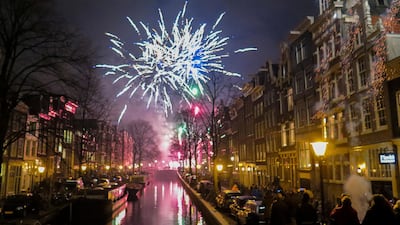The Dutch government on Friday outlawed traditional fireworks over New Year, saying the one-off ban would help hospital workers overburdened by the coronavirus pandemic.
New Year's celebrations in the Netherlands are notoriously wild, with people setting off tens of millions of dollars worth of fireworks in back gardens and streets, often causing injuries.
That threatens to clash with a second wave of Covid-19 infections, with more than half of the country's 609 intensive care beds currently occupied by coronavirus patients.
"The sale and lighting of fireworks will face a one-off ban during the coming year-end," the Dutch cabinet said.
"This is to avoid extra pressure on already over-burdened care workers and to maintain public order."
Anyone breaching the ban will be liable for a €100 ($118) fine and a criminal record, Dutch Justice Minister Ferd Grapperhaus told public broadcaster NOS.
The Netherlands has been under a partial lockdown since early October to curb the coronavirus pandemic, with cases on a slow downward trajectory but currently running at about 6,000 a day.
Although fireworks have been set off for centuries in the Netherlands, it has been particularly popular at New Year's since the 1950s.
The Dutch fondness for fireworks turns streets to battlefields as rival groups of revellers fire them at each other, flooding emergency wards with people suffering burn injuries or missing limbs.
Last year, more than 1,300 people had to be treated for fireworks-related injuries.
"Even without the impact of coronavirus, there is always a heavy burden on first-aid workers and police over this time," Dutch Prime Minister Mark Rutte said at his weekly news conference on Friday.
An organisation representing the pyrotechnics industry in the Netherlands, however, questioned the wisdom of the move.
"We are afraid that due to the ban some fireworks enthusiasts will turn to illegal fireworks" with lower safety standards, said Marcel Teunissen, chairman of the Dutch Pyrotechnics Federation.

